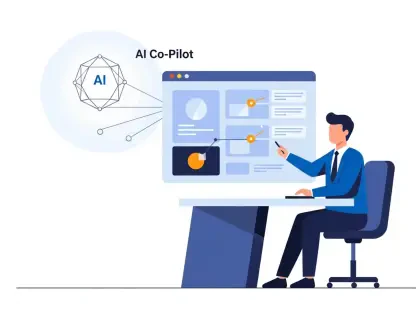Artificial intelligence (AI) is transforming industries across the board, and software development is no exception. The integration of AI into software development processes is enhancing efficiency, reducing errors, and streamlining workflows. From AI-powered code assistants to advanced project management tools, developers are now equipped with powerful aids that promise to revolutionize traditional coding techniques. As developers increasingly embrace these advancements, AI is becoming an indispensable part of the software development lifecycle, driving both innovation and efficiency.
A significant shift in software development is the adoption of AI tools designed to tackle repetitive and time-consuming tasks that have traditionally bogged down developers. By leveraging extensive databases of existing code and using sophisticated algorithms, AI tools can offer smart suggestions and automate various steps within the development process. This not only accelerates production timelines but also drastically enhances code quality and reliability. Consequently, developers are finding themselves unburdened from mundane tasks, allowing them to focus on solving complex problems and creating more robust applications. This article explores the various ways in which AI is revolutionizing software development and highlights the most impactful tools in use today.
AI in Software Development: An Overview
AI’s presence in software development has expanded significantly in recent years, transforming how developers approach coding, testing, and project management. These intelligent systems leverage extensive datasets to assist developers in generating, debugging, and testing code, thereby increasing productivity and ensuring higher code quality. Developers now have access to tools that analyze patterns, learn from vast amounts of data, and provide real-time suggestions to make the development process smoother and more efficient.
For example, AI-powered tools can now predict the next line of code a developer might write or identify and fix bugs before they become significant issues. The automation of these tasks does more than just save time; it also minimizes human error, leading to more reliable software. As AI technologies continue to evolve, their ability to understand and replicate human coding behaviors enhances, making them increasingly valuable in the software development lifecycle. This transformation is not just a fleeting trend; it’s a profound shift that is poised to become the new standard in the industry.
AI-Powered Code Assistants
One of the most prominent applications of AI in software development is through AI-powered code assistants like GitHub Copilot and Tabnine. These tools offer real-time code suggestions and autocompleting functions, enabling developers to write code more efficiently. GitHub Copilot, for instance, uses machine learning algorithms trained on open-source code to recommend entire code snippets or classes. This not only accelerates coding but also reduces common syntax and logical errors, making the development process more streamlined and less prone to mistakes.
Similarly, Tabnine integrates with various code editors to provide intelligent code completions, helping developers focus on more complex aspects of their projects. These tools are not just for seasoned developers; novices can also benefit significantly as they provide context-relevant code snippets that facilitate faster learning. The speed, efficiency, and reduced error rates that these AI-powered code assistants bring to the table are transforming how developers approach coding, making the entire process more intuitive and efficient.
The real-time capabilities of these code assistants mean that developers can receive instant feedback and suggestions, significantly speeding up the coding process. This is particularly beneficial when working with unfamiliar libraries or frameworks, as the tools can offer relevant code snippets that align with best practices. Moreover, by automating routine coding tasks, developers can dedicate more time to solving complex problems and innovating new solutions. As a result, AI-powered code assistants are becoming an essential part of modern software development, helping developers of all skill levels to work more efficiently and effectively.
Improving Code Quality and Debugging
Debugging and ensuring code quality are critical aspects of software development, and AI tools such as DeepCode and Snyk are revolutionizing this space with advanced code analysis and vulnerability detection. DeepCode employs machine learning to scan codebases for bugs, inefficiencies, and security vulnerabilities, integrating seamlessly into development environments to offer real-time feedback. This proactive approach ensures that issues are identified and addressed early in the development cycle, leading to more secure and efficient software.
Snyk, on the other hand, focuses on identifying and fixing security vulnerabilities in open-source dependencies, providing robust security checks throughout the development lifecycle. The integration of these AI tools into the coding process enhances code quality by detecting complex bugs that might elude human reviewers. Early bug detection not only improves software security and reliability but also reduces the cost and time required to fix issues later in the development cycle, making the overall process more efficient.
Additionally, these tools offer real-time monitoring capabilities that integrate into CI/CD pipelines, enabling continuous code quality checks and instant issue flagging. This ongoing monitoring means developers are constantly informed about the state of their code, allowing for prompt action when issues arise. By streamlining the debugging process and maintaining high code quality standards, AI tools like DeepCode and Snyk are making significant contributions to the software development landscape, ensuring that applications are both robust and secure.
Automated Testing and Continuous Integration
Automated testing is a cornerstone of modern software development, and AI is playing a pivotal role in enhancing this process. Tools like Testim and Mabl are at the forefront, using AI to create intelligent test cases and automate the testing process for complex applications. These tools leverage machine learning to design and execute test cases, ensuring comprehensive test coverage that includes edge cases and potential bugs. The integration of AI in automated testing is transforming how developers approach quality assurance.
Testim, for example, uses AI to streamline the design and execution of test cases, saving developers significant time and effort. Mabl offers similar capabilities, integrating seamlessly with continuous integration/continuous deployment (CI/CD) pipelines to provide instant feedback on code quality. These AI-driven testing tools prioritize tests based on risk profiles, optimizing test management and making the entire process more efficient. By automating regression tests and continuous monitoring, they not only save time but also allow developers to concentrate on core development tasks.
The benefits of incorporating AI into automated testing extend beyond just time and cost savings. These tools enhance test accuracy and reliability, ensuring that all potential issues are identified and addressed before deployment. This proactive approach to testing contributes to creating more stable and secure applications, ultimately leading to a better user experience. As AI-driven testing tools continue to evolve, their ability to predict and identify issues further solidifies their role as indispensable assets in the software development lifecycle.
Enhancing Project Management
AI isn’t just transforming coding and testing; it’s also revolutionizing project management through platforms like Asana and Monday.com. These tools utilize AI algorithms to optimize task management, resource allocation, and progress tracking. By leveraging AI, project managers can make more informed decisions about timelines, resource distribution, and task prioritization, enhancing the overall efficiency of software development projects.
Asana and Monday.com use AI to predict project durations, recommend task priorities, and allocate resources based on team members’ strengths. This optimization not only boosts operational efficiency but also ensures that projects are completed on time and within budget. By automating administrative tasks and providing real-time insights, AI-enhanced project management tools allow developers to focus more on coding and less on managerial duties, making the development process more streamlined and productive.
These tools also offer real-time data on project progress, enabling timely and informed decision-making. Project managers can quickly identify bottlenecks and adjust plans accordingly, ensuring that development stays on track. The integration of AI in project management tools is transforming how teams collaborate and manage their workflows, leading to more efficient and successful project outcomes. As AI continues to evolve, its role in project management is only expected to grow, offering even more advanced capabilities for optimizing software development processes.
The Role of Natural Language Processing in Development
Natural Language Processing (NLP) is another significant AI advancement impacting software development. Tools like OpenAI’s GPT-4 and Hugging Face Transformers are helping developers by enhancing documentation, communication, and even code generation. NLP tools assist in generating API documentation and translating code comments into various languages, making codebases more accessible to a global developer community. This capability is particularly useful for teams working across different geographies, as it ensures that all team members have a clear understanding of the code.
Moreover, NLP tools simplify technical jargon, translating it into layman’s terms for non-technical stakeholders, thereby improving communication between developers and business units. This translation capability ensures that everyone involved in a project, regardless of technical expertise, has a clear understanding of the project’s status and requirements. Additionally, NLP-driven conversational bots can be integrated into customer support systems to provide automated yet intelligent responses, enhancing user experience while allowing developers to focus on more complex tasks.
The benefits of NLP in software development extend to creating conversational interfaces and tools that understand and process human language more accurately. This capability enables the development of more intuitive user interfaces and applications that can interact with users in more natural ways. As NLP technologies continue to improve, their role in software development is likely to expand, offering even more advanced capabilities for enhancing communication, documentation, and overall user experience.
AI-Driven DevOps and Automation
DevOps practices are also reaping the benefits of AI, particularly in the areas of automation and monitoring. Terraform, with its AI-enhanced capabilities, is a prime example of how AI is facilitating automated cloud infrastructure deployment and management. This automation reduces human errors and speeds up the development cycle, making the deployment process more reliable and efficient.
AI tools within Terraform can monitor system performance, predict potential issues like server overloads, and optimize resource allocation. This predictive monitoring ensures higher reliability and efficiency in deploying cloud infrastructure. By automating these processes, AI-driven DevOps tools contribute to a more agile development environment, enabling faster and more reliable deployments. This capability is particularly beneficial for organizations looking to scale their operations quickly and efficiently.
The integration of AI in DevOps also extends to continuous monitoring and optimization of deployed applications. AI tools can analyze performance data in real-time, offering insights and recommendations for improving system performance and reliability. This ongoing optimization ensures that applications run smoothly and efficiently, providing a better user experience. As AI technologies continue to evolve, their role in DevOps is expected to grow, offering even more advanced capabilities for automating and optimizing the software development lifecycle.
Challenges and Limitations
Despite its numerous advantages, AI integration in software development is not without challenges. Data security and privacy concerns are significant issues that developers must address when using AI tools. The use of third-party services may involve transferring proprietary code, posing potential security threats. Ensuring that these tools comply with data protection regulations and best practices is crucial to mitigating these risks.
Another challenge is the accuracy of AI-generated recommendations. While these tools can offer significant insights and automation, they are not infallible. Developers must critically evaluate AI-generated suggestions to ensure that they align with best practices and do not introduce inefficiencies or errors into the codebase. Over-reliance on AI can also lead to technical debt if faulty recommendations are not properly vetted and corrected.
Moreover, there’s the risk of developers becoming too dependent on AI tools, which can stifle creativity and problem-solving skills. While AI can automate many tasks, human intuition and insight remain critical in developing innovative and effective software solutions. A balanced approach, where AI tools complement human expertise, is essential for leveraging the full potential of AI in software development.
Conclusion
Artificial intelligence (AI) is revolutionizing industries, and software development is no exception. Integrating AI into software development is improving efficiency, reducing errors, and streamlining workflows. From AI-powered code assistants to sophisticated project management tools, developers have powerful aids that promise to transform traditional coding techniques. As these advancements gain traction, AI becomes an essential part of the software development lifecycle, fostering both innovation and efficiency.
A major shift is the adoption of AI tools to handle repetitive and time-consuming tasks that traditionally slowed developers down. Using vast code databases and advanced algorithms, AI tools provide intelligent suggestions and automate various development steps. This speeds up production timelines and significantly improves code quality and reliability. Developers are thus freed from mundane tasks, enabling them to concentrate on solving complex problems and building more robust applications. This article delves into how AI is changing software development and highlights the most impactful tools in use today.









